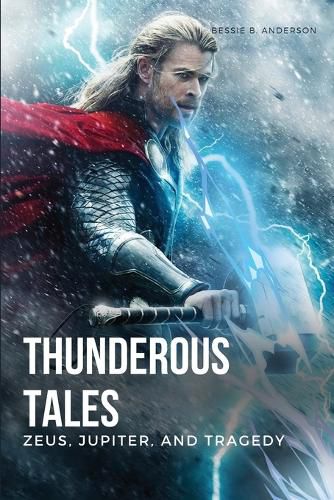Readings Newsletter
Become a Readings Member to make your shopping experience even easier.
Sign in or sign up for free!
You’re not far away from qualifying for FREE standard shipping within Australia
You’ve qualified for FREE standard shipping within Australia
The cart is loading…






This title is printed to order. This book may have been self-published. If so, we cannot guarantee the quality of the content. In the main most books will have gone through the editing process however some may not. We therefore suggest that you be aware of this before ordering this book. If in doubt check either the author or publisher’s details as we are unable to accept any returns unless they are faulty. Please contact us if you have any questions.
Embark on a captivating exploration of the divine realm through this comprehensive study and comparison of the gods Zeus and Jupiter as portrayed in the tragedies of Euripides and Seneca. Focused on the tragic representation of these deities, the book delves into the multifaceted levels of meaning embedded in individual references within each play. The study carefully examines both the similarities and differences in Euripides' depiction of Zeus and Seneca's portrayal of Jupiter, elucidating the impact of these variations on the interpretation of both the god and the overarching drama.
Structured into three distinct parts, each with thematic subdivisions, the study provides a nuanced analysis. Part I, "The Cosmos," explores broad concepts such as fate, justice, and nature, dedicating a chapter to each. Part II, "Family," delves into the familial relationships of Zeus and Jupiter with other deities and mortals, addressing their roles as both "Father of Gods" and "Father of Men" in separate chapters. Finally, Part III, "Challengers," examines potential threats to the supreme position of Zeus and Jupiter. This section explores early cosmogonic enemies, such as the Titans, Giants, and Typhoeus, along with figures molded in their image, like Capaneus and Ajax. The concluding chapter analyzes Seneca's Medea and Atreus as successful opponents of Jupiter, with Medea posing a threat to Jupiter's world-order and Atreus emerging as Jupiter's successor.
$9.00 standard shipping within Australia
FREE standard shipping within Australia for orders over $100.00
Express & International shipping calculated at checkout
This title is printed to order. This book may have been self-published. If so, we cannot guarantee the quality of the content. In the main most books will have gone through the editing process however some may not. We therefore suggest that you be aware of this before ordering this book. If in doubt check either the author or publisher’s details as we are unable to accept any returns unless they are faulty. Please contact us if you have any questions.
Embark on a captivating exploration of the divine realm through this comprehensive study and comparison of the gods Zeus and Jupiter as portrayed in the tragedies of Euripides and Seneca. Focused on the tragic representation of these deities, the book delves into the multifaceted levels of meaning embedded in individual references within each play. The study carefully examines both the similarities and differences in Euripides' depiction of Zeus and Seneca's portrayal of Jupiter, elucidating the impact of these variations on the interpretation of both the god and the overarching drama.
Structured into three distinct parts, each with thematic subdivisions, the study provides a nuanced analysis. Part I, "The Cosmos," explores broad concepts such as fate, justice, and nature, dedicating a chapter to each. Part II, "Family," delves into the familial relationships of Zeus and Jupiter with other deities and mortals, addressing their roles as both "Father of Gods" and "Father of Men" in separate chapters. Finally, Part III, "Challengers," examines potential threats to the supreme position of Zeus and Jupiter. This section explores early cosmogonic enemies, such as the Titans, Giants, and Typhoeus, along with figures molded in their image, like Capaneus and Ajax. The concluding chapter analyzes Seneca's Medea and Atreus as successful opponents of Jupiter, with Medea posing a threat to Jupiter's world-order and Atreus emerging as Jupiter's successor.